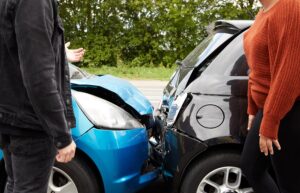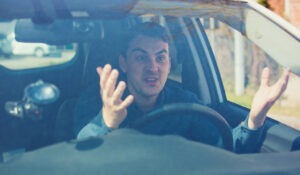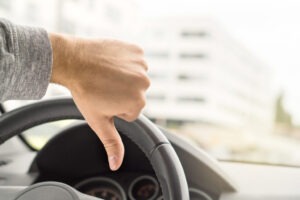
A car accident can cause devastating injuries and property damage. In general, the party or parties that caused or contributed to that car accident bear legal liability for the associated financial damages, but to claim compensation, the victim of that accident must identify the liable parties. How can you tell who bears fault for a car accident?
Start by hiring an attorney. An experienced Fort Myers car accident attorney can help identify the party or parties liable for an auto accident and file a personal injury claim for you, so you can seek compensation for the full cost of your injuries. Not only will an attorney gather evidence related to your accident, but also the law firm can put you in touch with expert witnesses who can help evaluate the accident and determine fault. An attorney may ask several questions related to the accident.
What Does the Police Report Say About the Accident?
After a serious accident, the police will evaluate the scene and develop an official accident report that indicates fault in the accident. Typically, this police report assesses the scene of the accident and will assign liability to one or more drivers. While police officers will try to evaluate the accident to the best of their abilities, including evaluating the positions of the vehicles and collecting witness statements, that initial investigation may not include a full evaluation of all of the factors that could have contributed to the accident, including mechanical failure.


Expect More, Receive More: Legal Support That Feels Like Family
Which Driver Engaged in Negligent Behavior at the Time of the Accident?
Negligent driving behavior can cause serious accidents. To help determine the party liable for your accident, your attorney may consider multiple types of negligent behavior, including the following:
Distracted driving. In just five seconds, a car traveling at an average of 55 miles per hour can travel the length of an entire football field. In those seconds, anything can happen. All too often, unfortunately, drivers become distracted behind the wheel.
Every year, distracted driving causes thousands of accidents, including many that result in severe injury. Most people assume that if they do not check their phones behind the wheel, they have not driven while distracted. Distracted driving, however, includes more than just cell phone use.
Distracted driving can also mean:
- Eating or drinking behind the wheel, especially eating messy foods
- Putting on makeup or fixing hair
- Checking or programming the GPS
- Carrying on a conversation with someone in the car, especially children
- Reaching for something dropped in the vehicle
- Adjusting the radio or temperature controls
Driving under the influence. After just one drink, many drivers notice changes in their behavior, focus, and ability to control their vehicles safely. More drinks and a higher blood alcohol content can interfere with fine motor skills, decision-making, and reflexes. After several drinks, drivers may struggle with tunnel vision. Drunk drivers also have a higher likelihood of making unwise and dangerous decisions behind the wheel, increasing the accident risk for everyone around.
Sober drivers frequently cannot predict the behavior of drunk drivers, making it difficult and unsafe to drive around them. In addition to driving under the influence of alcohol, drivers may face impairment due to prescription medication use, nonprescription drug use, and even over-the-counter medication use.
Driving drowsy. Like driving under the influence of drugs or alcohol, driving while drowsy can significantly impact a driver’s ability to safely control his or her vehicle. Drowsy drivers may fall asleep behind the wheel, leaving them out of control of their vehicles, or may simply suffer from decreased reaction times and decreased judgment, which can increase the risk of an accident. Drowsy drivers should, instead, pull off the road and rest until they can safely resume their trips.
Speeding. Even a 1 percent rise in a driver’s speed can raise the risk of an accident. Not only that, but high rates of speed can also lead to greater injuries when an accident does occur. High rates of speed mean greater levels of force exerted on both vehicles at the time of the accident. Nevertheless, many drivers choose to speed to cut down on drive time.
Aggressive driving. Swerving in and out of traffic, tailgating, and slamming on the brakes abruptly can make it hard for other drivers on the road to react safely, especially if the aggressive driver suffers from road rage. Aggressive driving can substantially increase the risk of an accident and lead to increased injuries when an accident does occur.
Ignoring the rules of the road. Running a stop sign, ignoring a yield sign, or rolling straight through a red light can all lead to severe injuries in an accident. Some drivers, however, may miss those signs due to distraction, or ignore them altogether, often due to excessive rush to reach a destination. A driver that ignores the rules of the road, especially traffic signs and signals, may bear liability for an accident.
An attorney will carefully evaluate all of the factors that could contribute to an accident to help determine which driver bears liability for your accident.
For example, your attorney may:
- Consult witnesses to the accident. Ideally, the attorney would like to take a statement from those witnesses as soon after the accident as possible, since witness memories may fade quickly in the aftermath of an accident.
- Check for any video footage of the accident. Video footage can provide a clear picture of exactly what happened during the accident. An attorney may look over dash camera footage, as well as look for traffic or security camera footage of the accident.
- Review pictures of the accident scene and the damage to the two vehicles. Often, an expert witness can use these images to reproduce the scene of the accident and determine fault.
Did Any Outside Factors Contribute to the Accident?
Drivers must make many decisions every time they get behind the wheels of their vehicles. Ultimately, those drivers bear liability for the decisions that they make and any accident caused by those decisions. However, in some cases, outside factors may contribute to an auto accident, leaving liability in the hands of another entity.
Often, working with an attorney can help you identify those outside factors that may have contributed to your auto accident. If you identify outside factors that contributed to the accident, it can increase the compensation you receive for your injuries. In many cases, other entities, including auto manufacturers and mechanics, carry insurance policies with higher coverage than the average driver.
Mechanical Failures
After an accident, the insurance companies of both parties will likely go over both vehicles to assess the damage to them. Sometimes, the insurance companies simply need to know how much damage each vehicle suffered in the accident, which will determine the cost to repair the vehicle, as well as whether the insurance company will choose to repair the vehicle or simply total it and provide the replacement cost to the owner.
During that evaluation, however, an experienced mechanic may identify problems with the vehicle that led to the accident. An attorney may also identify potential vehicle defects by checking recall notices and other recent accidents, especially with regards to newer vehicles. If mechanical failure caused the accident, that may shift the balance of liability.
In such a situation, liability may rest with one or more of the following parties:
The vehicle manufacturer. Some vehicles contain defects that make the vehicles dangerous on the road. Brake defects, for example, may make it impossible for a driver to stop safely. Unfortunately, vehicle owners may have no idea of a brake defect until they attempt to stop in conditions that trigger the defect. When a manufacturer puts out a vehicle with a known defect or does not take steps to protect the drivers of those vehicles and others who share the road with them, the manufacturer may share liability for any accident caused by those defects.
A mechanic who recently worked on the vehicle. In some cases, a vehicle owner may note a problem with the vehicle and take it to the mechanic. Once the mechanic evaluates the vehicle and completes the repair, that mechanic bears liability for the work done on the vehicle. The mechanic indicates, by returning the vehicle to the owner, that it has received an adequate repair. If the mechanic fails to complete the repair properly, either through negligence or malice, the mechanic may bear liability for any accident caused by his or her failure.
In some cases, the mechanic may mistakenly cause damage to another part of the vehicle while conducting a repair. For example, during a standard oil change, a mechanic who does not replace the oil cap correctly could cause the car to run out of oil, ultimately causing a serious accident. The mechanic should carefully evaluate any areas of the vehicle affected or potentially affected by those repairs to ensure that he or she causes no additional damage.
In addition, the mechanic should evaluate the area of the vehicle on which he or she works and check to make sure the vehicle has no other obvious problems. When a mechanic certifies a vehicle as road-worthy despite obvious defects and problems that the mechanic should have noted during a routine repair or inspection, that mechanic may share liability for any accident.
The vehicle owner. Both commercial companies that send out drivers as part of their job requirements and private individuals who allow others to borrow their vehicles, must take care of upkeep on their vehicles, including routine maintenance, like oil changes, tire rotations and changes, and all other repairs. Some vehicle owners, including both companies and private individuals, may put off routine vehicle maintenance to save on vehicle costs. Unfortunately, ignoring routine maintenance can significantly increase the risk of an accident. Putting off that maintenance may leave a vehicle owner liable for any damages associated with the accident.
Commercial Drivers
Companies that employ commercial drivers must exercise appropriate precautions to insure that their drivers and the others who share the road with them remain as safe as possible. Sometimes, however, these companies fail to exercise the appropriate duty of care when it comes to taking care of their drivers and their vehicles. Some companies may, for example:
Continue to employ drivers with significant accident histories. Companies should terminate the employment of any driver that causes accidents on a regular basis. A driver involved in occasional accidents may not face severe penalties, but a driver who routinely speeds, fails to follow the rules of the road, drives distracted, or fails to control his or her vehicle properly should not drive for the company. Companies should also have policies that involve the quick termination of drivers who drive under the influence.
Try to require drivers to ignore legal requirements for the time they can spend behind the wheel. Drivers can only spend a set number of hours behind the wheel at a single stretch and over the course of each day. Equally importantly, many drivers, especially those who travel across the country rather than remaining within a specific region, may only drive for a set number of hours each week. Companies that force drivers to exceed those hours may face severe legal consequences, especially if that driver causes an accident due to excessive fatigue.
Require drivers to drive in unsafe conditions. Ultimately, drivers must decide whether they feel safe driving in specific circumstances, including in bad weather conditions or while ill. Companies, however, may pressure their drivers to continue driving in spite of unsafe conditions, including driver illness or inebriation. If the company forces the driver to drive in those conditions, the company may share liability for the accident.
If you’ve suffered injuries in a car accident, contact an attorney as soon as possible. An experienced personal injury attorney can evaluate your accident or reach out to expert witnesses, who can reconstruct the scene of the accident or evaluate the vehicles involved in the accident. By evaluating who caused or contributed to your auto accident, you can file a personal injury claim against each entity that contributed, increasing your total compensation and helping you take care of the expenses associated with your injuries.
Call or text (239) 334-3933 or complete a Free Case Evaluation form






